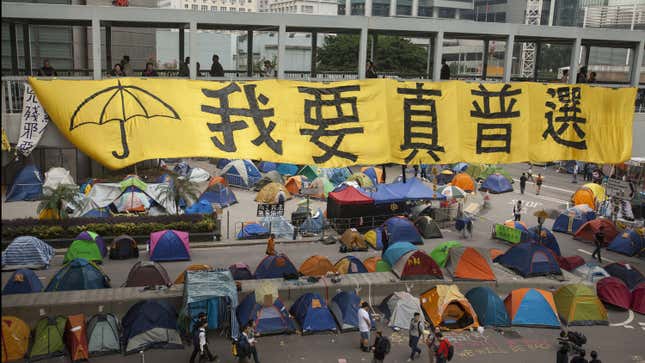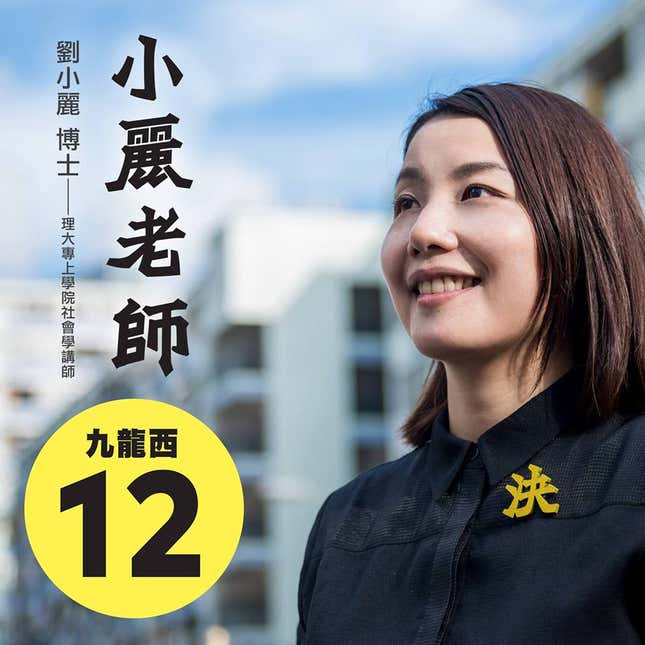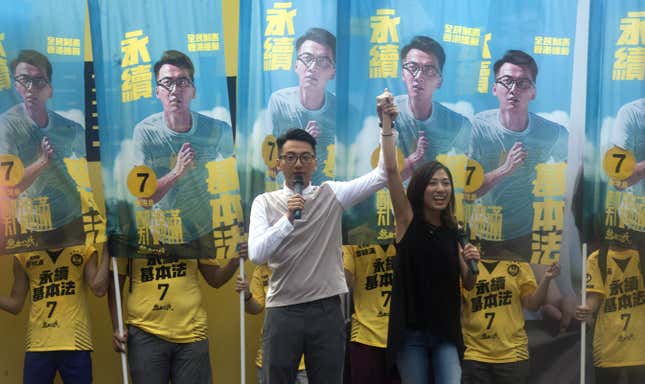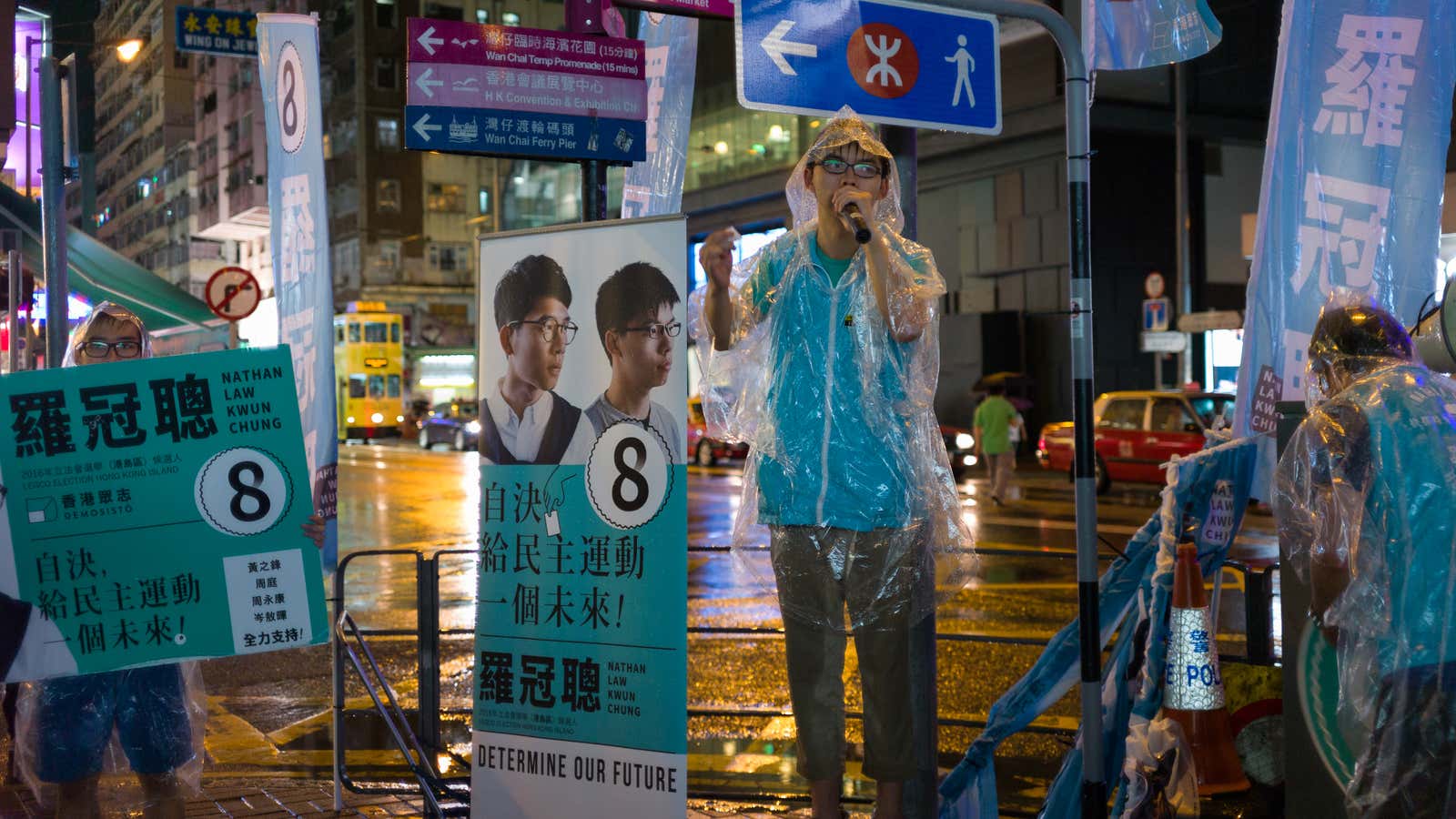Two years after the pro-democracy Occupy protests took over Hong Kong, the city will face its first major electoral test when it goes to the polls on Sept. 4 to elect a new legislature. The protests, however, may have done more to divide the city’s pro-democracy forces than unite them, leaving Hong Kong’s Bejing-leaning political leaders in a potentially stronger position than ever before.
During the 2014 demonstrations, opposition groups rallied around a single issue, universal suffrage—the right to elect the city’s top official, the chief executive. Before then, the political landscape was fairly neatly divided between the traditional pro-democracy parties and pro-Beijing ones. But feelings of fatigue and disappointment after Occupy ended, and Beijing’s rapidly growing interference in the city’s affairs, is pushing some citizens to more radical parties to break what they see as a political stalemate.
“The Occupy movement was probably the beginning of the collapse of that unity, in terms of how far one is prepared to go down the road to fight against Beijing,” said Cheung Chor-yung, a political scientist at the City University of Hong Kong. “We no longer see a united opposition.”

The issue threatens to destabilize the world’s most important financial center behind New York and London, a city that is home to the Asian headquarters of some 1,400 international companies, and a transportation and shipping hub responsible for over 5% of the world’s trade.
Ahead of the election, pro-democracy opposition parties hold enough seats in the Legislative Council to veto legislation, making it harder for pro-Beijing parties to push through laws that could potentially strengthen the Chinese Communist Party’s grip over Hong Kong and weaken the things that make it so attractive to global companies and investors, like an independent rule of law and a strong anti-corruption agency.
But that veto power is fragile, and many worry that legislation could be introduced to curb civil liberties such as free speech, media freedom, and the right to protest. Teachers and parents fear that government could try once again to introduce laws to make patriotic education compulsory schools. There are worries that Hong Kong’s much-admired anti-graft agency has already started to succumb to the influence of Beijing.
Even if the opposition retains veto power after this election, some fear that fragmentation could make it more difficult for the pro-democracy bloc to stand up to the powerful pro-Beijing parties, ultimately turning the legislature into an even more confrontational and dysfunctional arena.
Who’s on the ballot?
All 70 seats in Hong Kong’s Legislative Council, or Legco, are up for grabs in this election, and about 300 candidates are running. The seats are divided between directly elected geographical constituency seats, and functional constituency seats which represent different business and social sectors in Hong Kong and are not elected by universal suffrage. The opposition parties, also called the pan-democrats, currently hold 27 seats, enough for the one-third veto power that has been used to block, for example, a proposal to change how the chief executive is elected in 2017. At the very least they will want to retain that power.

This year, in addition to the vanguard of the pro-democracy movement like the Democratic Party and the lawyer-heavy Civic Party, voters can choose from an array of Occupy-inspired candidates. The awkwardly named Youngspiration, formed months after the end of the Occupy protests, advocates “self-determination” and prioritizing Hong Kong people’s needs. One independent candidate, Lau Siu-lai, a teacher, is known for her ”mobile classrooms” which took place around Hong Kong during Occupy to educate people about democracy. She was arrested during the “Fishball Revolution” riots at the beginning of the year for hawking without a license after she set up a small stand selling squid.
Joshua Wong, 19, the face of the Occupy protests and former leader of now-disbanded student group Scholarism, is unable to run in the election because he is not yet 21.
Choosing radicalism
Some voters feel that only newer, or more radical candidates, could finally break the political stasis in Hong Kong. In fact, these new parties are attracting citizens that have never voted before.
“I didn’t vote in previous elections because Hong Kong has long been dominated by the pro-democracy and pro-establishment camps… I didn’t feel I had a choice,” said Thomas Hon, 43, who works in the media industry. He plans to vote for Hong Kong Resurgence, a party led by Chin Wan, a professor of Chinese whose book Hong Kong as a City-State is considered by some to be the founding philosophy behind the self-determination movement in Hong Kong.

Evon Wong, 58, is also voting for the first time next week and plans to cast her vote for a candidate belonging to the localist party Civic Passion. Localism espouses the idea that Hong Kong identity is separate to mainland Chinese, and fiercely protects the city’s values and traditions. One of Civic Passion’s candidates, long-time political firebrand Raymond “Mad Dog” Wong, is known for his extreme political views and violent actions, and once threw a glass at deeply unpopular Hong Kong chief executive Leung Chun-ying.
“The Occupy protests opened my eyes to politics,” said the homemaker (no relation to Raymond Wong). “The most important thing is for Hong Kong not to become like China. I just want a change. Hong Kong is so broken right now, I hope there’s a new power that can change that.”
On the extreme end of the localist spectrum, some candidates are advocating outright independence for Hong Kong. The idea is gaining traction among Hong Kong’s youth, leading the government to ban some pro-independence candidates from running altogether, and quashing discussion of the issue in schools.
Avery Ng, a member of the League of Social Democrats party, said he is worried by the rise of some of these radical parties, which he said promote racist rhetoric against mainland Chinese and have launched smear campaigns against pro-democracy parties.
“We are now in the trough of the democratic movement…People felt a wave of hopelessness after the Umbrella Movement,” said Ng, explaining what is driving people to support radical parties. “That’s why there is heavy fragmentation. It is hampering our efforts in solidifying opposition voices.” Ng’s party was once considered radical among Hong Kong political parties. Its founding member and current lawmaker, “Long Hair” Leung Kwok-hung, is known for his Marxist views and is typically seen chainsmoking in t-shirts emblazoned with Che Guevara’s face.
Now, according to Hong Kong political analyst Suzanne Pepper, Long Hair is just seen as a “moderate radical.”
Looking to 2047
Amid all the differences and in-fighting in the opposition camp, what is certain is that more and more Hong Kong people are thinking about the future beyond this election or the 2017 chief executive race. They are now focused on what happens 31 years in the future, when Beijing’s promise that Hong Kong would be “unchanged for 50 years” after the handover from Britain expires.
The newer political forces are driving this discussion and thinking of ways to rethink the city’s relationship with Beijing altogether, as decades of negotiations, attempts at compromise, and playing by the rules, have not worked.
“I started to feel that people need to care more about the implementation of ‘One Country, Two Systems’,” after several Hong Kong booksellers who sold books critical of the Communist Party disappeared, said Cassadee Wong, 20, a student at the University of Hong Kong and first-time voter. “One country two systems” refers to part of Hong Kong’s Basic Law, which guarantees different rights for the city than citizens on the mainland.
Even pro-Beijing politicians think the system is at risk. Jasper Tsang, a veteran pro-Beijing politician and former schoolteacher, warned in an interview with the South China Morning Post that ongoing interference by Beijing in Hong Kong affairs could undermine the model.
The “2047 problem” forms the crux of the manifesto of Demosistō, a party formed from members of Scholarism and the Hong Kong Federation of Students (HKFS), the two main student-led protest groups during Occupy. The party is fielding former HKFS head, 23 year-old Nathan Law, as its sole candidate in the elections. Demosistō is pushing for a referendum to determine the city’s future. Unlike negotiations in the 1980s between the UK and China, Hong Kong people should have a say in their future this time, the party believes.
“I think the older generation needs to make way for the younger generation,” said Fu Hiu-yum, 67, now retired, as he cried after a recent Demosistō rally. He said he decided to vote for Law instead of the traditional pro-democracy parties after attending the rally. “There’s no use in negotiating with the Chinese Communist Party anymore.”
Tom Tsui contributed reporting




